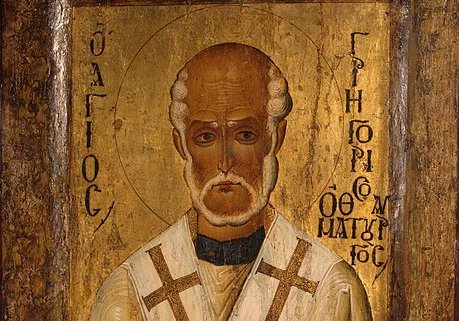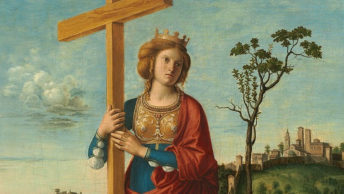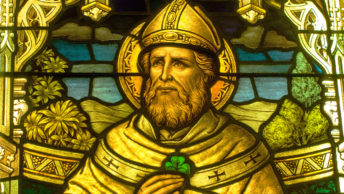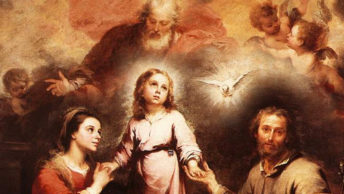 A great but little-known saint of the 3rd century was St. Gregory of Neocaesaria—an ancient city located north of modern-day Turkey. When Gregory became bishop of that wealthy but immoral city around the year 238, there were only seventeen Christians there. Through his inspired preaching and personal example of kindness and generosity, he quickly made many converts, and by the time of his death thirty years later, virtually the entire city was Christian. Gregory also had the gift of performing miracles—so much so that he is known to history as “St. Gregory the Wonderworker.” For instance, he picked up and moved giant boulders; changed the course of rivers in the name of Christ; dried up a lake over which two brothers were violently arguing; cast out demons; cured the sick; and foretold the future. He was also the recipient of the second-ever recorded apparition of the Blessed Virgin Mary, under the title of Our Lady of Neocaesaria.
A great but little-known saint of the 3rd century was St. Gregory of Neocaesaria—an ancient city located north of modern-day Turkey. When Gregory became bishop of that wealthy but immoral city around the year 238, there were only seventeen Christians there. Through his inspired preaching and personal example of kindness and generosity, he quickly made many converts, and by the time of his death thirty years later, virtually the entire city was Christian. Gregory also had the gift of performing miracles—so much so that he is known to history as “St. Gregory the Wonderworker.” For instance, he picked up and moved giant boulders; changed the course of rivers in the name of Christ; dried up a lake over which two brothers were violently arguing; cast out demons; cured the sick; and foretold the future. He was also the recipient of the second-ever recorded apparition of the Blessed Virgin Mary, under the title of Our Lady of Neocaesaria.
Our Lady had first appeared to one of the apostles, St. James the Greater, the brother of St. John the Evangelist, around the year 40AD, when James was experiencing difficulties evangelizing in Spain; she encouraged him to persevere, promised to help him, and predicted he would die as a martyr a few years later, which in fact happened. After this, it was over 200 years before anyone had another vision of Mary—and St. Gregory the Wonderworker was the recipient of this great honor. He had been trying, without much success, to understand the concept of the Holy Trinity, so as to present this teaching to his people in a way they could grasp. Our Lady appeared to him, along with St. John the Evangelist; Mary asked the apostle to explain the mystery of the Trinity to St. Gregory, which St. John gladly did. This allowed Gregory to write a document called The Exposition of Faith, which aided his missionary efforts and also advanced the Church’s understanding of the Trinity. Just as St. Gregory’s renewed understanding of the Trinity inspired him to continue in his ministry and do great things in Christ’s Name, so should our Christian belief in the Most Holy Trinity cause us to live in a way that glorifies God.
The word “Trinity” does not appear anywhere in the Bible, for the simple reason that the Church herself invented this word as a convenient way of referring to the reality of Three Persons in God—a concept that does appear in Scripture, as today’s readings show. The 1st Reading from the Book of Proverbs speaks of the wisdom of God, and the Holy Spirit is sometimes described in this manner, even as Jesus Himself is understood as the perfect embodiment of Divine Wisdom. In the 2nd Reading St. Paul tells us that we have peace with God the Father through His Son, Jesus Christ, and—through the gift of the Holy Spirit—the love of God has been poured into our hearts. Furthermore, Jesus speaks in the Gospel of His unity with the Father and the Holy Spirit, and promises that—as long as our hearts are open—the Holy Spirit will guide us to all truth, making it possible for us to fulfill our mission in life and achieve wonderful things in God’s Name.
When you think about it, the number three plays an important role in our identity as persons and in our efforts to live the Christian life. For instance, our experience of time is threefold: we all have a past, a present, and a future. The direction of our love should be threefold: we’re called to love God, our neighbor, and also ourselves—in the best sense of the term. Our lives are most directly shaped and influenced by three groups of people: our families, our relatives, and our friends. The course of our lives often has three stages: when we’re very young, others—namely, our parents—care for us; then we become independent, and care for ourselves; still later, we take care of others, especially our parents and other family members. In terms of our identity, we are, at one and the same time, residents of the United States, members of the One True Church, and citizens of the Kingdom of Heaven.
Because the number three is so dynamic and central to our existence and our human nature, it should also be operative in our efforts to live out the Gospel. Specifically, we must try to answer the call of Jesus by a simple, three-step process. First of all, we must pray for His guidance, so that we’ll know or be able to discern what He wants us to do in any given situation—for instance, whether to volunteer for a certain activity, whether to correct someone’s misbehavior or maintain a prudent silence, whether to accept or decline a certain opportunity, and so on. The Lord will always assist those who sincerely seek to know His will. Secondly, as we live out our faith in the events of daily life and perform certain actions or fulfill our duties, we should consciously try to do everything for God’s glory, instead of our own, imitating Jesus’ prayer in the Garden of Gethsemani: “Father, not My will, but Your will be done.” Actively cooperating with Divine Grace through this sort of obedience and self-surrender allows wonderful, holy, and often unexpected things to happen. Thirdly, we should afterwards always praise and thank God for everything that occurred, including not only our successes, but also our failures; not only our joys, but also our sorrows; and not only our blessings, but also our burdens—for living in this sort of spirit of gratitude and trust allows God to turn burdens into unexpected blessings. If we indeed seek God’s glory in all things, then everything we experience can bring us closer to Him, assist us in growing in grace, and help bring about the coming of His Kingdom.
We don’t have to perform wonders like St. Gregory of Neocaesaria in order to make a difference in the world; we simply have to seek God’s glory in all things, do our best to live as true followers of Jesus, and open our hearts as fully as we can to the gifts of the Holy Spirit. It’s highly unlikely any of us will come to understand the mystery of the Most Holy Trinity as a result of a vision of Our Lady, but that’s not necessary; as long as we honestly try to put our faith into practice, we will share ever more deeply in the life- giving love of the Three Divine Persons, and one day be made perfectly ready to see God face to face.








